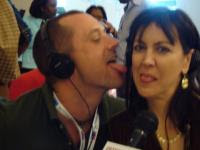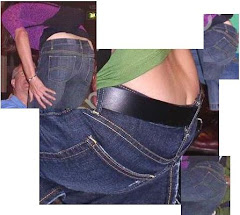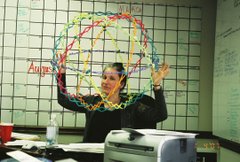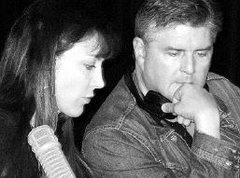 [To the loyal readers of this blog,
[To the loyal readers of this blog,Please excuse me for reproducing an article in its entirety and calling it a post, but it is all I can do today. I not only didn't make it to Columbus, Ohio to meet Stephanie and work on the Obama campaign, but I have spent another weekend basically house bound, in and out of bed, and still battling depression. I guess I couldn't even follow through on my own cure - the trip to Ohio. I apologize and will try to shake off this downtrodden feeling and write a real post sometime soon. Again, I am sorry =(.]
Is Depression Good for You?
By Tom Geoghegan
BBC News Magazine
Pills aren't the answer to helping many people recover from depression, says a report out this week. But there's growing evidence that gloominess could be a positive experience.
What depressed the cavemen? It may strike us as a particularly modern malaise for a time-poor, fast-paced society but a new reappraisal of depression suggests it has always been around.
A leading psychiatrist says that depression is not a human defect at all, but a defence mechanism that in its mild and moderate forms can force a healthy reassessment of personal circumstances.
Dr Paul Keedwell, an expert on mood disorders at the Institute of Psychiatry, King's College London, argues all people are vulnerable to depression in the face of stress to varying degrees, and always have been.
The fact it has survived so long - and not been eradicated by evolution - indicates it has helped the human race become stronger.
FAMOUS DEPRESSIVES
Robbie Williams, Sir Elton John, Winston Churchill and Stephen Fry
Writers Tennessee Williams, Sylvia Plath, Evelyn Waugh and Ernest Hemingway
Artists Paul Gauguin, Vincent Van Gogh, Edgar Degas, William Blake
Performers Caroline Ahern, Ewan McGregor, Morrissey
"There are benefits and that's why it has persisted. It's a tough message to hear while you are in depression but I think that there's a life afterwards," he says.
"I have received e-mails from ex-sufferers saying in retrospect it probably did help them because they changed direction, a new career for example, and as a result they're more content day-to-day than before the depression."
One woman left an abusive relationship and moved on, he says, and might not have done if depression had not provided the necessary introspection.
Similarly, unrealistic expectations are revised when depression sparks a more humble reassessment of strengths and weaknesses.
In Britain one in four men and one in five women are estimated to suffer depression during their lifetime, and one in 20 suffers it at any one time.
Creativity
Dame Kelly Holmes has spoken in the past about how the depression she suffered in 2003 made her a stronger person, a year before her double-gold performance at the Olympics. Alastair Campbell has said it was the making of him.
But there are other qualities depression generates, not just resilience, says Dr Keedwell, author of How Sadness Survived.
"Psychological unease can generate creative work and the rebirth after depression brings a new love affair with life."
Aristotle believed depression to be of great value because of the insights it could bring. There is also an increased empathy in people who have or have had depression, he says, because they become more attuned to other people's suffering.
"Don't beat yourself up about being depressed, in most cases it will run its course."
Dr Paul Keedwell
Depression can be traced all the way back to the Stone Age, say Dr Keedwell, when close-knit communities of about 50 people would have identified it quickly. The rest of the group would have rallied round and changes followed, such as a new role for the individual.
Some remote communities are more aware of it. The Banda tribe in Uganda calls it "illness of thought" and those affected are allowed time out from the group, a concession not extended to many with the condition in the UK.
The high and rising incidence in the UK and US - compared to countries like Brazil and Mexico - could be due to the breakdown of family bonds and the fragmentation of society. And compared to past decades, there are increased expectations of success.
SEVERE DEPRESSION
Dr Keedwell says his theory does not cover severe depression, which is an illness accompanied by a catatonic lack of energy, cannot be worked through and requires the intervention of a GP
Anti-depressants, which were reported this week to have little clinical benefit for many patients, have a part to play, says Dr Keedwell, especially in severe depression. But an individual must address the social or emotional cause either on his own, with a loved one or with a professional.
"Don't beat yourself up about being depressed, in most cases it will run its course provided you take yourself out of the situation that caused it.
"I know that's an easy and glib thing to say, because I'm not a single mum living 12 floors up in a high-rise block. Sometimes it's not easy to escape but that's the fault of society, not the fault of depression."
GWB, not GDP
Politicians have recognised this and happiness is a word that has recently entered the political debate on both sides, with David Cameron saying that improving society's sense of well-being is one of the central political challenges of the times - GWB (general well-being) and not GDP (gross domestic product).
A happiness agenda is a laudable aim but one that is meaningless, says Phillip Hodson, a fellow of the British Association for Counselling and Psychotherapy, because happiness is not something you can buy in Tesco.
"Everybody's life is full of occasional misery and we are going to suffer. All life ends in grief, unless you are lucky and you and your loved ones all die simultaneously in some plane crash.
"So I applaud the government for trying but I think the happiness agenda can be simplistic. You can't legislate for happiness."
He agrees with Dr Keedwell that depression, however horrible, does imbue people with a useful resource.
"You would never ask for it or want it this way. But people who work through it, with a professional or with friends and family, for those people who have an awful journey, they are better travellers."
But identifying the cause and addressing it is easier said than done, says Stuart Summerfield, 68, from Chesterfield, who has suffered from depression throughout his adult life. Although he believes he has a genetic predisposition to it, he blames its severity on his possessive mother.
She never acknowledged his illness and made it difficult for him to seek help, but her death in 1999 relieved him of caring duties and sparked a recovery. He is now involved in running a self-help group.
Superman
"I don't think that knowing the cause is always the route out. Changing circumstances is a major part of it but it's not always something you can change. Sometimes the big problem is admitting what the situation is."
He concedes it has helped him in some ways because he has a new appreciation of life.
"They say adversity makes you stronger, so I should be Superman by now."
But it is an "awful journey" and not a price worth paying for longer-term gain.
COMMENTS
A selection of your comments appears below.
Depression is bad, really bad. I suffered relationship and career breakdown 12 months ago with no one around me to help. I lost 20 kgs in 2007, it was a completely wasted year for me. But once everything went away, I realised I'm much healthier and stronger now. Maybe the main point of the article is valid, some of us do come stronger in the other side. The whole thing made me reassess my life, and career opportunities. I can see things in a different light now. I'm much happier and 10 times more determined to make the most of my life without stressing myself. Maybe I have the Kelly Holmes effect (resilience).
AC, UK
I have suffered with severe depression for around 10 years (I am in my early 20s now) and can honestly say that despite having some horrible dark moments that almost killed me, it has had a positive affect on my life. I had therapy, counselling and medication, which in combination helped me. I am now an occupational therapist, working in mental health. I have the chance to help people out of their own darkness and empower people to be as independent as possible. For me this is an amazing, positive outcome after years, and sometimes even now, of suffering from depression. I found this article refreshing, and it relates to my own beliefs; things happen for a reason.
Anon, Sussex
I have lived with depression on and off for many years and now see it as a positive experience. I'm more attuned to my stress levels and have learned effective coping methods to deal with difficult situations. I'm more appreciative of the kindness of others and more empathetic to their needs and moods. My experiences with depression have made me less judgemental and I now lead a more balanced life. From working a forty hour week and owning my own home, I now choose to live in a small rented apartment, not drive a car and have a far less "affluent" lifestyle, which allows me to work part time and use my "free" time for volunteering and family & friends. Depression isn't something I'd recommend but it can certainly be a path to better living habits and a higher quality of life appreciation, as long as the correct therapy is used. A combination of medication and talking therapy worked for me.
Val, Birmingham
I suffered with depression for years without even realising, until I met my fiance who made me realise I have a problem and seek help. I agree that the big problem is admitting what the situation is; once I admitted to myself I had a problem I was able to confront it and I am now a new person with so much more confidence...thanks to my fiance!
Hannah , South London
I suffered a breakdown after the death of my father two years ago. I had thought that this was my first experience of depression but looking back with the knowledge I have now I believe that I've had episodes throughout my life. I'm now really well and put my recovery down to rest, medication, diet and a wonderful support network. My GP once said that people often emerge from 'the dark place' that is depression with a great deal of emotional knowledge and empathy. She was right! Having a breakdown has changed my life for the better. I now look at the world with new eyes, I've become a much more compassionate and patient person and feel so much the better for it. Depression truly can help you clarify what is important. If you haven't already read it I suggest Richard Carlson's 'Don't sweat the small stuff'. True wisdom in a world where affluenza is making many ill and overshadowing what is truly important for a happy and contented life.
Clare, Chester
As someone who has suffered from depression for many years and have only just recently tried to seek any form of help for it I find it really difficult to see "the other side" at the moment, I cannot see how there will be a positive to come from going through this. Assuming I make it through this, I cant imagine being able to look back on these years and think "oh, I'm glad I went through that because now I can/am...." etc..
Rob, Bristol, UK
To Rob from Bristol, you may not see the other side at the present, but believe me, it will get better. It's never easy when you're going through the "dark times", please hang in there as things will improve. I fell into a deep depression two years ago when the love of my life died. I thought my life was meaningless and I was convinced I would die too. More importantly, I wanted to die. I thought at my age (44) how could I start again? I lost my home and now can't afford a place of my own but I've learnt life is much more than our material possessions and with help I'm now learning to take each day at a time. Chin up Rob, it will get better.
Flora , London
I suffered depression during a very difficult period of my life. My friends and family supported me and I have been able to recover. I really agree that you need to take yourself out of the situation that caused it before you can move on. I have done exactly that and my life has improved ennormously. Depression is a human reaction to help us get our lives back on track. It is hard to believe that things will get better when you depressed but they do - time is the most important healer.
Clare Prior, Southsea
When you stop hitting your hand with a hammer it feels good. This doesn't mean that hitting your hand with a hammer it good for you.
Kris, London
My depression was hormonal when I was a teenager and I wouldn't wish it on my worst enemy. I just had to wait until my hormones settled down.
Jan Peddie, Prenton, Wirral
Against Happiness
In Praise of Melancholy
Eric G. Wilson
NPR covers Mr. Wilson and his new book (Against Happiness)
Support the Mental Health Parity Bill (HR 1424)
































































